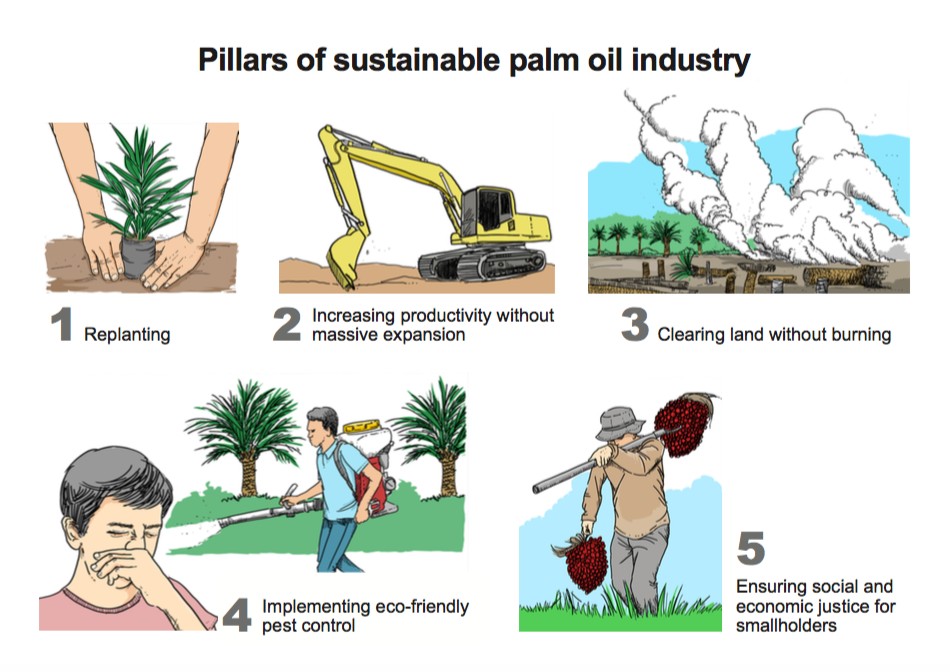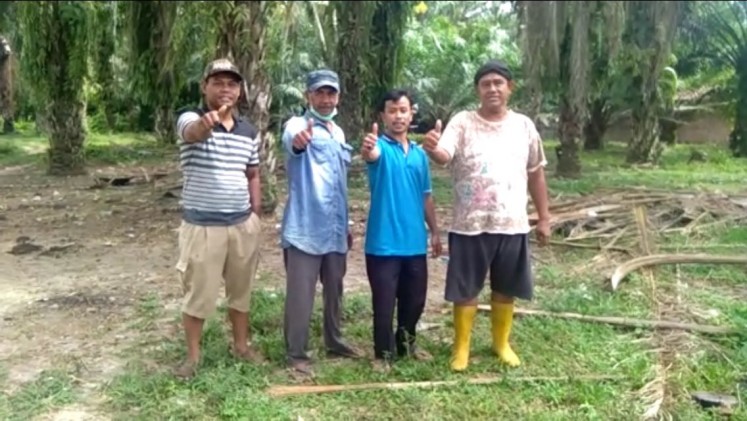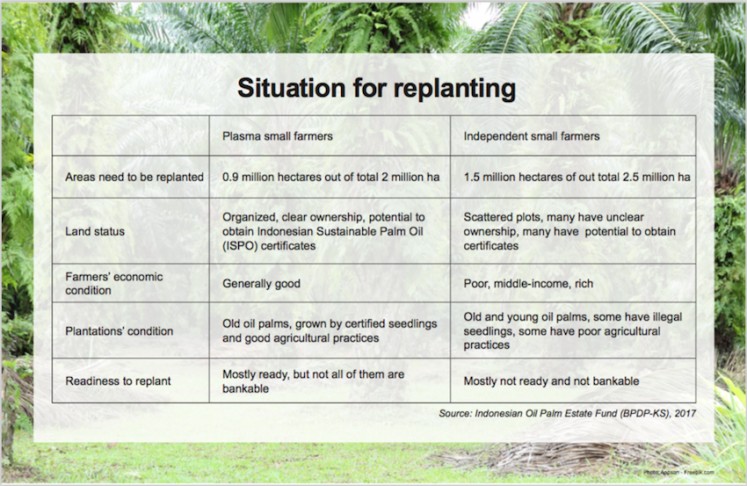Popular Reads
Top Results
Can't find what you're looking for?
View all search resultsPopular Reads
Top Results
Can't find what you're looking for?
View all search resultsIndependent oil palm smallholders neglected in sustainability effort
Encouraging smallholders to replant is key to sustainability in Indonesia, because they manage around 40 percent all oil palm plantations in Indonesia or about 4.5 million ha of the total 11.26 million ha based on a government estimate.
Change text size
Gift Premium Articles
to Anyone
Some 25 years ago, Tugimin, 57, made one of the most important decisions of his life.
Tugimin, was a corn farmer in 1993 when one of his friends urged him to turn to a more profitable commodity: palm oil.
"I had no experience when I started [growing oil palm]," Tugimin said on Wednesday. "So I learned how to cultivate oil palm from my friend and, thank God, the results have satisfied me."
But now Tugimin faces a serious problem that could threaten his business, a 2-hectare plantation located in Maligas Tonga village, Simalungun, North Sumatra. His oil palm plantation has experienced a decline in productivity and needs to be replanted—one of several methods advocated by the government to ensure sustainability. However, he does not have the funds to do so.
"Replanting requires a lot of money," said Tugimin, a father of four who also lives in Simalungun. The lion's share of his profit goes to covering his family's daily needs and his children's education. "I've been saving money for the past six years, but it is still only a small amount."
Tugimin (right) poses with his friends at his palm oil plantation in Simalungun regency, North Sumatra. (Courtesy of Tugimin/-)Replanting will involve at least cutting the old trees, buying new seeds and rehabilitating the soil, all of which requires a lot of money. After replanting, farmers need to wait years to reap the profits from the plants. Abandoning old fields and clearing new ones is cheaper.
Encouraging smallholders to replant is key to sustainability in Indonesia, because they manage around 40 percent all oil palm plantations in Indonesia or about 4.5 million ha of the total 11.26 million ha based on a government estimate. Some 2.5 million ha of those 4.5 million ha are managed by independent smallholders, the rest is managed by so-called plasma smallholders, or farmers tied to companies.
In a study published this week by the World Resource Institute Indonesia (WRI Indonesia), researchers argued that smallholders, especially the independent ones, "have few resources at their disposal" to start producing palm oil sustainably.
Most people point fingers at large corporations when it comes to problems within the palm oil industry, WRI researchers said, referring to the environmental and social issues NGOs have long blamed on the industry, such as deforestation, forced labor and the diminishing populations of threatened species like orangutans.
"But that's overlooking a key actor in palm oil production: small-scale farmers," the research report says.
Petani kecil swadaya (independent smallholders) face constraints like limited support from the government, companies and banks, as well as their vulnerability to exploitation.
Thanks to the increasing global demand for palm oil, smallholders— of both the independent and plasma type — are set to manage 60 percent of Indonesia's oil palm plantations by 2030, according to the Palm Oil Agribusiness Strategic Policy Initiative (PASPI).
Sustainability in the palm oil industry
Researchers, environmental activists and industry players have realized that the way forward in the palm oil industry is to achieve sustainability.
“The main principle of sustainable oil palm plantation is quite simple: Don’t neglect the negative impacts on the environment, such as forest and land fires,” said Fitrian Andriansyah of the Sustainable Trade Initiative (IDH), a foundation that promotes market transformation through sustainable supply chains.
The more productive an oil palm plantation is, the smaller the environmental impact, Fitrian said.
However, palm cultivation has a cycle of 20 to 30 years. Once the peak productivity passes, it declines.
Fitrian said parties like banks and the Indonesian Oil Palm Estate Fund (BPDP-KS)—a government-sanctioned agency that collects palm oil product export levies to finance sustainability initiatives—needed to pay more attention to smallholders to help finance replanting activities.
According to various estimates, replanting oil palm can cost smallholders between Rp 60 million (US$4,200) and Rp 92 million per ha.
(JP/Budhi Button)President Joko "Jokowi" Widodo’s administration has proclaimed a target of carrying out replanting on 185,000 ha belonging to smallholders this year. Government estimates show that of the 4.5 million ha under smallholders, 2.4 million ha need to be replanted.
Bambang, the director general for plantation, said the realistic target for replanting was 100,000 ha, pointing to the need to ensure tenure certainty, commitment from seedling producers and the Finance Ministry, which manages the replanting fund, to disburse the money.
The government had secured commitments from 17 seedling producers to support the replanting effort, which would start in September this year, at the beginning of the rainy season, said Bambang.
The government, using the money managed by the BPDP-KS, will disburse Rp 25 million per ha to each small farmer. But many smallholders find that inadequate to finance the measure, forcing them to resort to banks to borrow money.
"Yet banks have always considered the risk of lending money to farmers high," Fitrian said.
A lack of support, such as when it comes to training and information on good agricultural practices and supervision, has affected productivity and is a concern for sustainability. Given the lack of support, independent small farmers, for instance, often purchase cheap, low-yield seedlings and burn land to make way for crops, the WRI researchers said.
Aware of the need to seek support, Tugimin, the oil palm farmer in Simalungun, recently joined a farmers' group, hoping he could at least gather information about government assistance for small-scale farmers.
"By joining a farmers' group, I hope to get assistance with replanting and the land certificate from the government."












